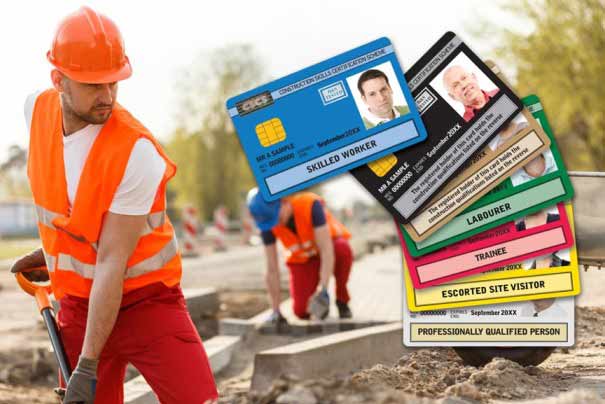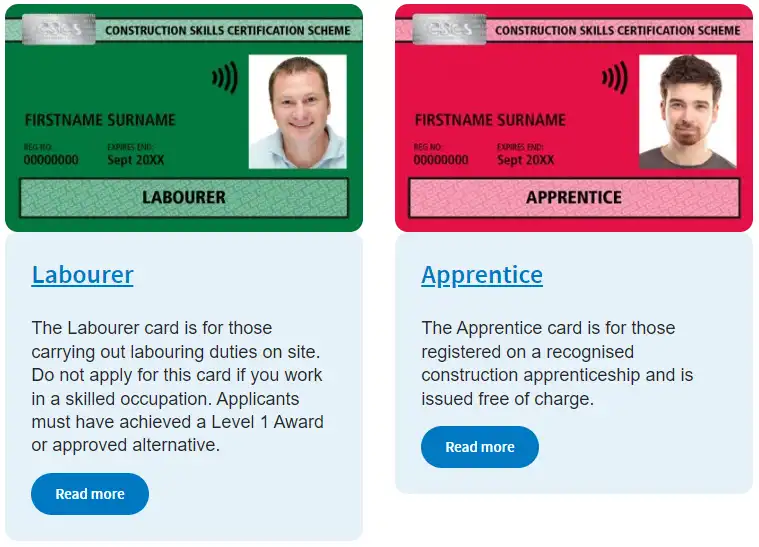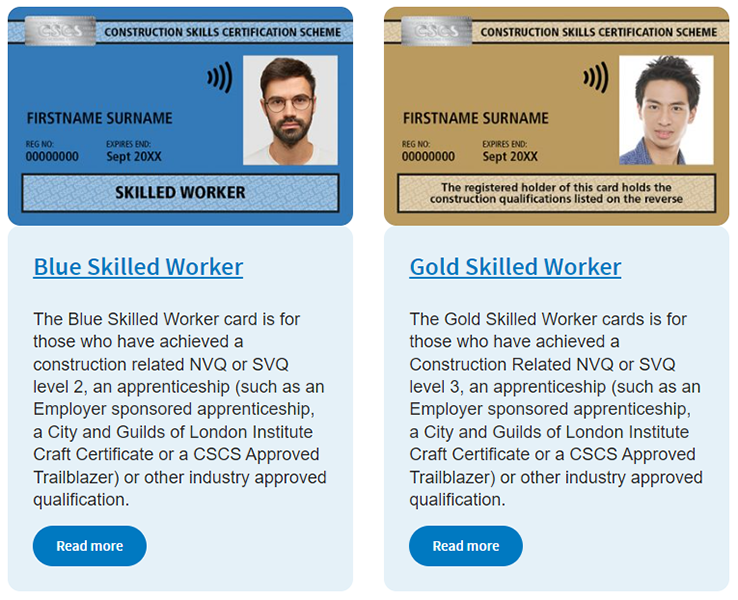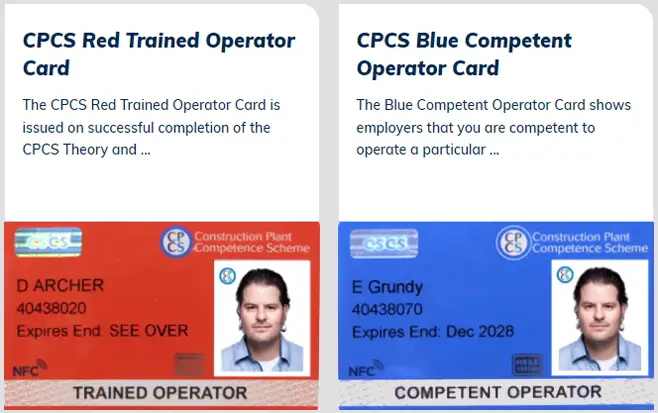Newton Abbot Office:
01626 572510
Bristol Office:
0117 4579111
Construction Recruitment Agency
No Payroll Admin Fees
Newton Abbot Office:
01626 572510
Bristol Office:
0117 4579111
Construction Recruitment Agency
No Payroll Admin Fees

Are you passionate about construction and aspiring to excel in the UK's thriving construction industry? To embark on a successful journey in this field, it's essential to understand the significance of obtaining the right qualifications and certificates. In this comprehensive guide, we will delve into the world of UK construction qualifications and certificates, exploring how they can pave the way for a rewarding career as well as how to get them. Whether you're a newcomer or a seasoned professional looking to upskill, this article will provide you with the insights you need to navigate the realm of construction qualifications.
In the dynamic landscape of the UK construction industry, having the right qualifications and certifications can significantly impact your career trajectory. As construction projects grow increasingly intricate and regulations become more stringent, employers yearn for individuals who not only exhibit technical prowess but also demonstrate a steadfast commitment to safety and excellence.
Contents:
Construction qualifications demonstrate your expertise, knowledge, and commitment to maintaining industry standards. They not only enhance your employability but also boost your credibility as a competent professional. With the construction industry becoming increasingly competitive, holding the right qualifications can be a game-changer.
A CSCS (Construction Skills Certification Scheme) Card is a crucial credential for individuals working within the construction industry. This card serves as tangible proof that a worker possesses the necessary skills, qualifications, and training required to perform their job safely and competently. The significance of holding a CSCS card extends beyond a mere formality; it directly impacts employability and job prospects within the construction field.
 Lowest Level CSCS Card examples from CSCS.uk.com
Lowest Level CSCS Card examples from CSCS.uk.comThe CSCS card is a fundamental requirement for most construction sites. It verifies that you possess the necessary health and safety knowledge to work safely. Different card colours represent varying levels of qualification, catering to various roles within the industry.
Most employers will require that a construction worker has a CSCS card. A CSCS Card is not just a simple piece of identification; it holds substantial value within the construction industry. Its necessity is underscored by the collective commitment to safety, competence, and professionalism on construction sites. A CSCS card signifies that a worker possesses the requisite skills and knowledge to execute tasks with precision while prioritizing safety protocols. It is a tangible testament to a worker's dedication to upholding industry standards, fostering a secure work environment, and contributing to the overall quality of construction projects.
Almost every construction job where you work on a site requires a CSCS card. Whether you're involved in hands-on labouring, technical installations, or supervisory roles, the common thread is the requirement for safety-conscious and skilled individuals. From carpenters to electricians, plumbers to project managers, the construction industry demands a unified commitment to competency and safety. The CSCS card acts as an equalizer, ensuring that every worker on the construction site shares a common baseline of skills and safety awareness.
Most CSCS cards are valid for 2-5 years.
Go to the CSCS website and complete the steps listed:
A CSCS card itself costs £36 and the CITB health & safety test costs £21. Investing in a CSCS card involves a financial commitment that is modest in comparison to the benefits it offers. The card itself is priced at £36, serving as a tangible symbol of an individual's dedication to professionalism and safety in the construction industry. In addition, the cost of the CITB Health & Safety test, at £21, contributes to the assurance that cardholders are well-versed in fundamental safety principles, ensuring a secure work environment for all.
NVQs are work-based qualifications that assess your practical skills and competency in real workplace environments. They offer a hands-on approach to learning and are available at different levels, reflecting your expertise and experience. Many employers value and often require job candidates to hold National Vocational Qualifications (NVQs) in relevant fields.
 CSCS Card examples from CSCS.uk.com with an NVQ
CSCS Card examples from CSCS.uk.com with an NVQMost roles where specialized skills and practical competence are essential require candidates to hold relevant National Vocational Qualifications (NVQs). The applicability of National Vocational Qualifications (NVQs) spans a wide spectrum of professions, each reliant on specialized skills and hands-on capabilities. From construction trades such as carpentry, plumbing, and bricklaying to sectors like healthcare, hospitality, and manufacturing, NVQs are integral to demonstrating mastery in a particular craft. Electricians, mechanics, healthcare assistants, chefs, and customer service representatives are just a few examples of roles where NVQs play a pivotal role in verifying practical proficiency.
The duration of National Vocational Qualifications vary based on the specific qualification and level pursued, often ranging from several months to a couple of years. The flexibility of NVQs lies in their adaptability to different learning paces and employment contexts. The duration is influenced by factors such as the chosen NVQ level, the complexity of the subject matter, and the individual's prior experience. This variability ensures that NVQs remain accessible to those seeking to enhance their skills and qualifications, regardless of their current commitments.
The process of obtaining a National Vocational Qualification (NVQ) involves a structured approach that combines practical assessments, workplace evidence, and sometimes classroom-based learning.
The cost of obtaining a National Vocational Qualification (NVQ) varies depending on factors such as the level of qualification, the sector, and the training provider. The investment in an NVQ is an investment in your professional growth and career advancement. The cost varies from qualification to qualification and often includes expenses related to training, assessment, and any required learning materials. While there is a financial commitment, the long-term benefits of holding an NVQ often far outweigh the initial costs by opening doors to enhanced job opportunities, career progression, and personal development.
City & Guilds certifications offer a practical avenue to enhance your skills and expertise through hands-on learning experiences. These certifications are tailored to assess your competence in real-world workplace environments. With various certification levels available, they cater to individuals with diverse expertise and experience. City & Guilds certifications hold a distinct value in the eyes of employers, frequently becoming prerequisites for prospective job candidates within relevant fields.

City & Guilds certifications are indispensable for roles that demand specialized skills and practical proficiency. The relevance of these certifications spans a broad spectrum of professions, each reliant on distinct skills and practical capabilities. From the trades of construction encompassing carpentry, plumbing, and bricklaying to sectors like healthcare, hospitality, and manufacturing, City & Guilds certifications serve as indicators of mastery in a specific craft. Electricians, mechanics, healthcare assistants, chefs, and customer service representatives are among those whose practical proficiency is verified through City & Guilds certifications.
The duration of City & Guilds certifications varies depending on the specific certification and level pursued. The timeframe ranges from several months to a couple of years, accommodating different learning paces and professional commitments. The adaptable nature of these certifications ensures that individuals can pursue skill enhancement and qualification attainment regardless of their current obligations. Factors influencing duration include the chosen certification level, the complexity of the subject matter, and your prior experience.
Acquiring a City & Guilds certification follows a structured pathway that incorporates practical assessments, workplace evidence, and, in certain cases, classroom-based learning:
The cost associated with obtaining a City & Guilds certification varies based on factors including the certification level, the industry sector, and the training provider. Although a financial commitment is involved, this investment translates into your professional growth and career progression. Costs typically encompass training, assessment, and any necessary learning materials. The long-term advantages of holding a City & Guilds certification, including expanded career prospects, upward mobility, and personal development, often outweigh the initial expenses.
For those operating heavy machinery, the CPCS card attests to your aptitude in maneuvering construction equipment safely and efficiently. This certification is pivotal for roles involving plant operations. The Construction Plant Competence Scheme (CPCS) is tailored for those operating heavy machinery and construction equipment. This qualification is essential for individuals responsible for the safe and efficient operation of machinery on construction sites. CPCS certifications validate your ability to operate machinery, enhancing your credibility and employability. Holding a CPCS certification is a testament to your expertise in machinery operation and contributes to the overall efficiency and safety of construction projects.
 CPCS Operator Card examples
CPCS Operator Card examplesThe CPCS scheme shows that you have the skills to operate relevant machinery. It also shows that you have a health and safety awareness of the machinery you are operating.
Most plant operators require a CPCS card, including:
The CPCS blue card lasts for 2 year and is non-renewable. The CPCS red card lasts for 5 years and is renewable.
There are two types of CPCS card; a red and a blue one. The red card shows that you are a trained operator, and the blue card shows that you are a competent operator.
For the red card you need to:
Similar to the CPCS, NPORS also validates your competence in plant operations. It provides an alternative route for those seeking recognition for their skills in operating construction machinery. For individuals working with a range of machinery and equipment in the construction industry, the NPORS card signifies your proficiency in safely operating these tools. This certification is particularly significant for roles involving the operation of various non-CPCS plant and machinery.
 NPORS Operator Card examples
NPORS Operator Card examplesThe NPORS card validates your competence in handling a diverse range of machinery. It also demonstrates your awareness of the associated health and safety protocols for the equipment you operate.
Various roles require an NPORS card, including:
The validity of an NPORS card can differ based on the card type and the specific category. Generally, NPORS cards are valid for 3 to 5 years, depending on the assessment criteria.
To obtain an NPORS card, follow these steps:
The cost of obtaining an NPORS card varies based on factors such as the type of card, the machinery or equipment, and the training provider. The expenses typically range from £200 to £600, depending on the complexity of the assessment and the category of machinery.
Geared toward management roles, these certifications emphasize safety management and leadership skills. SMSTS is tailored for site managers, while SSSTS caters to site supervisors. The Site Management Safety Training Scheme (SMSTS) is tailored for individuals aspiring to managerial roles within the construction industry. SMSTS equips you with the skills and knowledge necessary to manage safety on construction sites effectively. This qualification covers a wide range of topics, including risk assessment, health and safety regulations, and site management. By obtaining SMSTS certification, you position yourself as a responsible and capable leader who prioritizes the well-being of teams and the successful execution of projects.
The SMSTS certificate shows that you have knowledge of health and safety practices, CDM regulations, risk assessment, and other construction practices.
Main jobs requiring SMSTS are:
The certificate lasts for 5 years.
The course can be booked on the CITB website. It can be taken in a 5 day block, or one day a week over 5 weeks.
From £615
First Aid at Work certification is vital for anyone involved in construction activities. Construction sites present inherent risks, and being prepared to respond to emergencies is essential. First Aid at Work training equips you with life-saving skills, ensuring that you can provide immediate and effective assistance in the event of accidents or injuries. By holding this certification, you contribute to a safer work environment and enhance your employability within the construction industry.

First aider’s are needed in all construction sites.
This certificate is required mainly for managers.
3 years.
The easiest way to get the first aid at work qualification is to do the 3 day St John Ambulance course. This can be booked online.
The course costs between £250-£350.
Asbestos Awareness training is essential for individuals working in environments where asbestos may be encountered. Asbestos is a hazardous material commonly found in older buildings, and exposure to asbestos fibers can have severe health consequences. Asbestos Awareness training educates you about the risks associated with asbestos exposure and provides guidance on how to handle situations involving asbestos. By completing this training, you enhance your knowledge of workplace safety and contribute to the prevention of asbestos-related health hazards.
Anyone who works in an environment where asbestos is present is legally required to have asbestos training
Any job where you will be working on a building built before the year 2000.
Most courses do not carry an expiry date, however an employer may require you to take one every 12 months.
The UKATA has a list of training providers on their website. This course may be done online.
£0-£25
The Site Supervisor Safety Training Scheme (SSSTS) is designed for construction site supervisors. SSSTS training provides supervisors with essential skills in safety leadership, enabling them to oversee projects while ensuring the safety of their team members. This qualification covers key areas such as hazard identification, risk assessment, and the implementation of safety measures. SSSTS certification empowers supervisors to create a safe working environment and contribute to the overall success of construction projects.
 Construction Industry Training Board
Construction Industry Training BoardThe SSSTS course is will help you in understanding health and safety, what is expected of a supervisor, and teach construction best practices.
Most jobs where you have supervisory responsibilities, such as:
5 years
The course can be booked on the CITB website. It will take 2 days to complete.
The course normally costs £300-£400
The Electrotechnical Certification Scheme (ECS) is a valuable qualification for electrical professionals within the construction industry. ECS certification verifies your competence and expertise in electrical work. This qualification covers various aspects of electrical installation, maintenance, and safety. By obtaining ECS certification, you demonstrate your ability to perform electrical tasks safely and effectively, positioning yourself as a reliable and skilled professional in the field.
The ECS card shows that you meet a health & safety standard in the electro-technical industry.
The main job that the ECS is required for is and Electrician, as well as anyone else working in the electro-technical industry.
18 months – 3 years depending on the type of card
You can apply for the card online at the ECS website . You’re usually requires to have a BS7671 qualification, health & safety certificate, and sometimes an NVQ.
£48-£60 depending on the method of application
In the dynamic UK construction industry, qualifications and certifications are not just badges of honor; they're the stepping stones to a successful career. With each qualification earned, you enhance your skills, expand your horizons, and position yourself for growth. Approach the journey with dedication, enthusiasm, and a hunger for knowledge, and you'll reap the rewards of a thriving career in the dynamic world of UK construction.
Certifications are essential for most roles, especially those involving on-site work. They validate your skills and contribute to maintaining safety and quality standards on construction sites.
Evaluate your skills, aspirations, and desired career trajectory. Seeking advice from industry professionals can help you make informed decisions aligned with your goals.
Yes, certifications can enhance your versatility. While some certifications are role-specific, others provide foundational skills that can be applied across various roles, expanding your career opportunities.
Advanced certifications deepen your expertise in specialized areas of the construction industry. They position you as an authority, opening doors to leadership and specialized roles.
Stay engaged through industry publications, online forums, seminars, workshops, and professional associations. Proactive engagement ensures you remain informed and adaptable in a rapidly evolving industry.